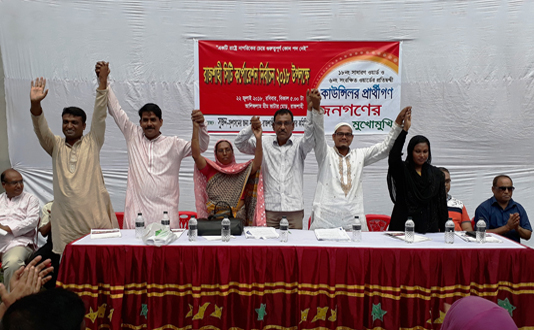RAJSHAHI, July 23, 2018 (BSS)- Twelve councilor candidates, including four for women reserved seats, in the Ward No-16 and 18 of the upcoming election of Rajshahi City Corporation (RCC) scheduled to be held on July 30, promised
to establish social justice if they were elected.
They also expressed their firm commitment of providing improved civic services together with freeing the society from all curses like child marriage, dowry, drug-addiction, terrorism and other crimes.
Besides, they will extend support towards transforming the city corporation administration into a corruption-free and pro-people entity.
The contestants made this commitment while taking part in two separate “Face-to-Face with People” programmes in the city on Sunday afternoon. Joining the programme, the candidates responded to a volley of questions
raised by the participants.
Sushasoner Jonno Nagorik (Sujan) organised the programme on the playground of Malda Colony and Alif Lam Meem Bhata crossing to make arrangement for the voters to ask their questions to the candidates.
The voters reminded the candidates that it was their moral responsibility to abide by the commitments they make before the election.
Sujan leaders called upon the voters to elect honest and competent candidates in the ward councilor polls to strengthen democracy and socio-economic development in the area.
The participating voters expressed solidarity with the call and signed a 13-point declaration at the event for a peaceful, free and fair election.
The voters also declared that they will boycott corrupts, terrorists, war criminals, violators against women, drug-peddlers and loan defaulters in the election.
On their part, the councilor aspirants elaborated their electoral commitments and plans.
Sujan Regional Coordinator Shashanka Boron Roy and Area Coordinator Subrata Kumar Paul conducted and moderated the programmes with its district unit vice-president Amanul Haque in the chair.
More than 2,500 people comprising voters in general, representatives from socio-cultural-professional bodies and human rights and election monitoring organisations took part in the programmes.



